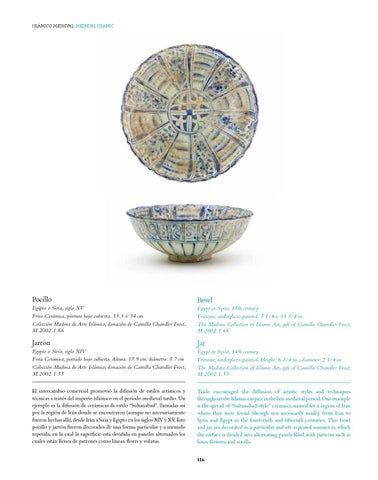Islámico medieval medieval islamic
Pocillo
Bowl
Egipto o Siria, siglo XV Frita Cerámica, pintura bajo cubierta. 13.3 x 34 cm Colección Madina de Arte Islámico, donación de Camilla Chandler Frost, M.2002.1.66
Egypt or Syria, 15th century Fritware, underglaze-painted. 5 1/4 x 13 3/8 in. The Madina Collection of Islamic Art, gift of Camilla Chandler Frost, M.2002.1.66
Jarrón
Jar
Egipto o Siria, siglo XIV Frita Cerámica, pintado bajo cubierta. Altura: 15.9 cm; diámetro: 5.7 cm Colección Madina de Arte Islámico, donación de Camilla Chandler Frost, M.2002.1.55
Egypt or Syria, 14th century Fritware, underglaze-painted. Height: 6 1/4 in.; diameter: 2 1/4 in. The Madina Collection of Islamic Art, gift of Camilla Chandler Frost, M.2002.1.55
El intercambio comercial promovió la difusión de estilos artísticos y técnicas a través del imperio islámico en el periodo medieval tardío. Un ejemplo es la difusión de cerámicas de estilo “Sultanabad”, llamadas así por la región de Irán donde se encontraron (aunque no necesariamente fueron hechas allí), desde Irán a Siria y Egipto en los siglos XIV y XV. Este pocillo y jarrón fueron decorados de una forma particular y a menudo repetida, en la cual la superficie está dividida en paneles alternados los cuales están llenos de patrones como líneas, flores y volutas.
Trade encouraged the diffusion of artistic styles and techniques throughout the Islamic empire in the late medieval period. One example is the spread of “Sultanabad-style” ceramics, named for a region of Iran where they were found (though not necessarily made), from Iran to Syria and Egypt in the fourteenth and fifteenth centuries. This bowl and jar are decorated in a particular and oft-repeated manner in which the surface is divided into alternating panels filled with patterns such as lines, flowers, and scrolls. 116
